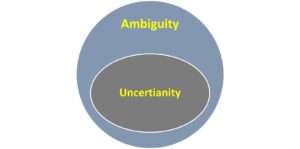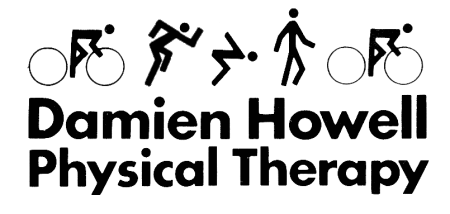Intellectual humility and tolerance for ambiguity

When dealing with musculoskeletal pain syndromes uncertainty and ambiguity can cause unease and frustration for both patients and clinicians.
The goal is to stamp out uncertainty, but not to stamp out ambiguity.
Ambiguity may contain uncertainty. But they are different.

Uncertainty is something that is not clearly or precisely determined, something unknown. Uncertainty implies that there is something to be certain about.
It is certain that I will die. It is uncertain when and how I will die. The connotation of uncertainty is more negative.
Ambiguity is being unclear or inexact because a choice between alternatives has not been made. Ambiguity is the quality of being open to more than one interpretation. The connotation of ambiguity is relatively positive or there is potential.
Intellectual humility involves embracing uncertainty and ambiguity. Intellectual humility involves recognizing that there are gaps in one’s knowledge and that one’s current beliefs might be incorrect. Research shows that individuals who have a high level of intellectual humility have a high tolerance for ambiguity. In medicine a tolerance for ambiguity is necessary.
Seeking to increase one’s level of intellectual humility can:
- Result in more thorough, well-informed decisions
- Foster problem solving
- Lead to more openness in cooperating with those who view things differently.
- Foster a collaborative and constructive approach to learning.
- Enhance creativity through reflective practice leading to creativity in practice.
This raises questions. How to improve the characteristics of intellectual humility? How to progress from uncertainty to ambiguity?
Humbly recognizing my own limitations, I am not an expert on how to get from the negative connotation of uncertainty to the positive connotation of ambiguity. But here are my thoughts on how to manage uncertainties and ambiguities regarding management of painful musculoskeletal pain syndromes:
- Seek more information. Tolerance for the unexplained should not mean we should not keep asking why.
- Consider the alternatives. Dealing with painful musculoskeletal syndromes there are different healthcare clinicians to choose from. There are alternatives and/or augmentations to consider when seeking a diagnostic image to diagnosis a musculoskeletal pain syndrome.

- Use reflective learning to facilitate a tolerance for ambiguity.
- Learn from role models who have succeeded in managing complex musculoskeletal pain syndromes to facilitate intellectual humility.
- Embrace ambiguity as the origin of possibility.
- As a patient with a choice of which healthcare provider to work with, choose one with a high level of intellectual humility rather than one with a high level of intellectual arrogance. Choose another provider.

“Although our intellect always longs for clarity and certainty, our nature often finds uncertainty fascinating.” – Karl Von Clausewitz
The information on this website is not intended or implied to be a substitute for professional medical advice, diagnosis, or treatment. You are encouraged to perform additional research regarding any information contained available through this website with other sources and consult with your physician.
Damien Howell Physical Therapy – 804-647-9499 – Fax: 866-879-8591 At-Home, At Office, At Fitness Facility – I come to you, I do home visits Damien@damienhowellpt.com
